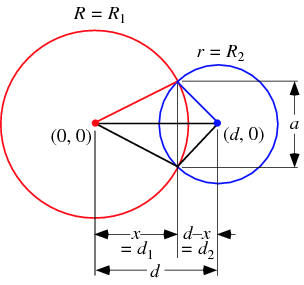

تاريخ الرياضيات

الاعداد و نظريتها

تاريخ التحليل

تار يخ الجبر

الهندسة و التبلوجي


الرياضيات في الحضارات المختلفة

العربية

اليونانية

البابلية

الصينية

المايا

المصرية

الهندية


الرياضيات المتقطعة

المنطق

اسس الرياضيات

فلسفة الرياضيات

مواضيع عامة في المنطق


الجبر

الجبر الخطي

الجبر المجرد

الجبر البولياني

مواضيع عامة في الجبر

الضبابية

نظرية المجموعات

نظرية الزمر

نظرية الحلقات والحقول

نظرية الاعداد

نظرية الفئات

حساب المتجهات

المتتاليات-المتسلسلات

المصفوفات و نظريتها

المثلثات


الهندسة

الهندسة المستوية

الهندسة غير المستوية

مواضيع عامة في الهندسة

التفاضل و التكامل


المعادلات التفاضلية و التكاملية

معادلات تفاضلية

معادلات تكاملية

مواضيع عامة في المعادلات


التحليل

التحليل العددي

التحليل العقدي

التحليل الدالي

مواضيع عامة في التحليل

التحليل الحقيقي

التبلوجيا

نظرية الالعاب

الاحتمالات و الاحصاء

نظرية التحكم

بحوث العمليات

نظرية الكم

الشفرات

الرياضيات التطبيقية

نظريات ومبرهنات


علماء الرياضيات

500AD

500-1499

1000to1499

1500to1599

1600to1649

1650to1699

1700to1749

1750to1779

1780to1799

1800to1819

1820to1829

1830to1839

1840to1849

1850to1859

1860to1864

1865to1869

1870to1874

1875to1879

1880to1884

1885to1889

1890to1894

1895to1899

1900to1904

1905to1909

1910to1914

1915to1919

1920to1924

1925to1929

1930to1939

1940to the present

علماء الرياضيات

الرياضيات في العلوم الاخرى

بحوث و اطاريح جامعية

هل تعلم

طرائق التدريس

الرياضيات العامة

نظرية البيان
Circle-Circle Intersection
المؤلف:
Sloane, N. J. A
المصدر:
Sequence A133741 in "The On-Line Encyclopedia of Integer Sequences."
الجزء والصفحة:
...
6-4-2020
1324

Two circles may intersect in two imaginary points, a single degenerate point, or two distinct points.
The intersections of two circles determine a line known as the radical line. If three circles mutually intersect in a single point, their point of intersection is the intersection of their pairwise radical lines, known as the radical center.

Let two circles of radii  and
and  and centered at
and centered at  and
and  intersect in a region shaped like an asymmetric lens. The equations of the two circles are
intersect in a region shaped like an asymmetric lens. The equations of the two circles are
 |
 |
 |
(1) |
 |
 |
 |
(2) |
Combining (1) and (2) gives
 |
(3) |
Multiplying through and rearranging gives
 |
(4) |
Solving for  results in
results in
 |
(5) |
The chord connecting the cusps of the lens therefore has half-length  given by plugging
given by plugging  back in to obtain
back in to obtain
 |
 |
 |
(6) |
 |
 |
 |
(7) |
Solving for  and plugging back in to give the entire chord length
and plugging back in to give the entire chord length  then gives
then gives
 |
 |
 |
(8) |
 |
 |
 |
(9) |
This same formulation applies directly to the sphere-sphere intersection problem.
To find the area of the asymmetric "lens" in which the circles intersect, simply use the formula for the circular segment of radius  and triangular height
and triangular height 
 |
(10) |
twice, one for each half of the "lens." Noting that the heights of the two segment triangles are
 |
 |
 |
(11) |
 |
 |
 |
(12) |
The result is
 |
 |
 |
(13) |
 |
 |
 |
(14) |
The limiting cases of this expression can be checked to give 0 when  and
and
 |
 |
 |
(15) |
 |
 |
 |
(16) |
when  , as expected.
, as expected.

In order for half the area of two unit disks ( ) to overlap, set
) to overlap, set  in the above equation
in the above equation
 |
(17) |
and solve numerically, yielding  (OEIS A133741).
(OEIS A133741).

If three symmetrically placed equal circles intersect in a single point, as illustrated above, the total area of the three lens-shaped regions formed by the pairwise intersection of circles is given by
 |
(18) |

Similarly, the total area of the four lens-shaped regions formed by the pairwise intersection of circles is given by
 |
(19) |
REFERENCES:
Sloane, N. J. A. Sequence A133741 in "The On-Line Encyclopedia of Integer Sequences."